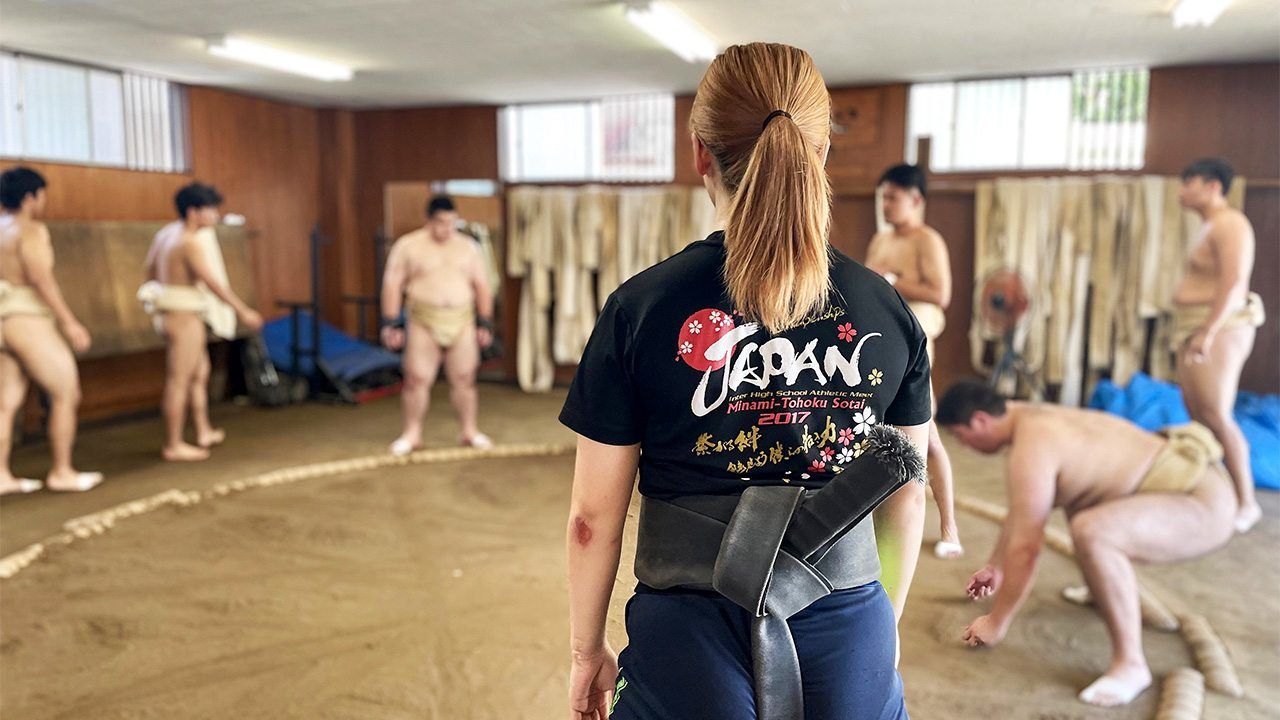
Four Women Wrestlers Taking on the World of Sumō
Sports Gender and Sex- English
- 日本語
- 简体字
- 繁體字
- Français
- Español
- العربية
- Русский
A Junior Woman Wrestler with “No Weak Points”
Abe Nana, now in ninth grade, is the pride of Niigata Prefecture: the “strongest sumō girl” in Japan as the 12-time winner of national tournaments. I witnessed her wrestle myself on New Year’s Day 2023, at the first-ever New Year’s Women’s Sumō Japan Championship. Planned by the athletes themselves as a way to demonstrate the excitement of women’s sumō, the event was run for women by women.
When the announcers called out Abe’s name, the mood at the venue took a sudden turn. From the moment she stepped into the ring, her presence overwhelmed everyone.
She gave a spirited bow and slapped her thighs loudly. The gyōji, or referee, called the traditional starting phrase “Hakkeyoi!” and, within the space of a breath, it was over.
This tournament saw her crowned as the first ever Junior High Division Queen, which she followed up with junior high division victories at the May and July National Championships. She has been unbeatable.
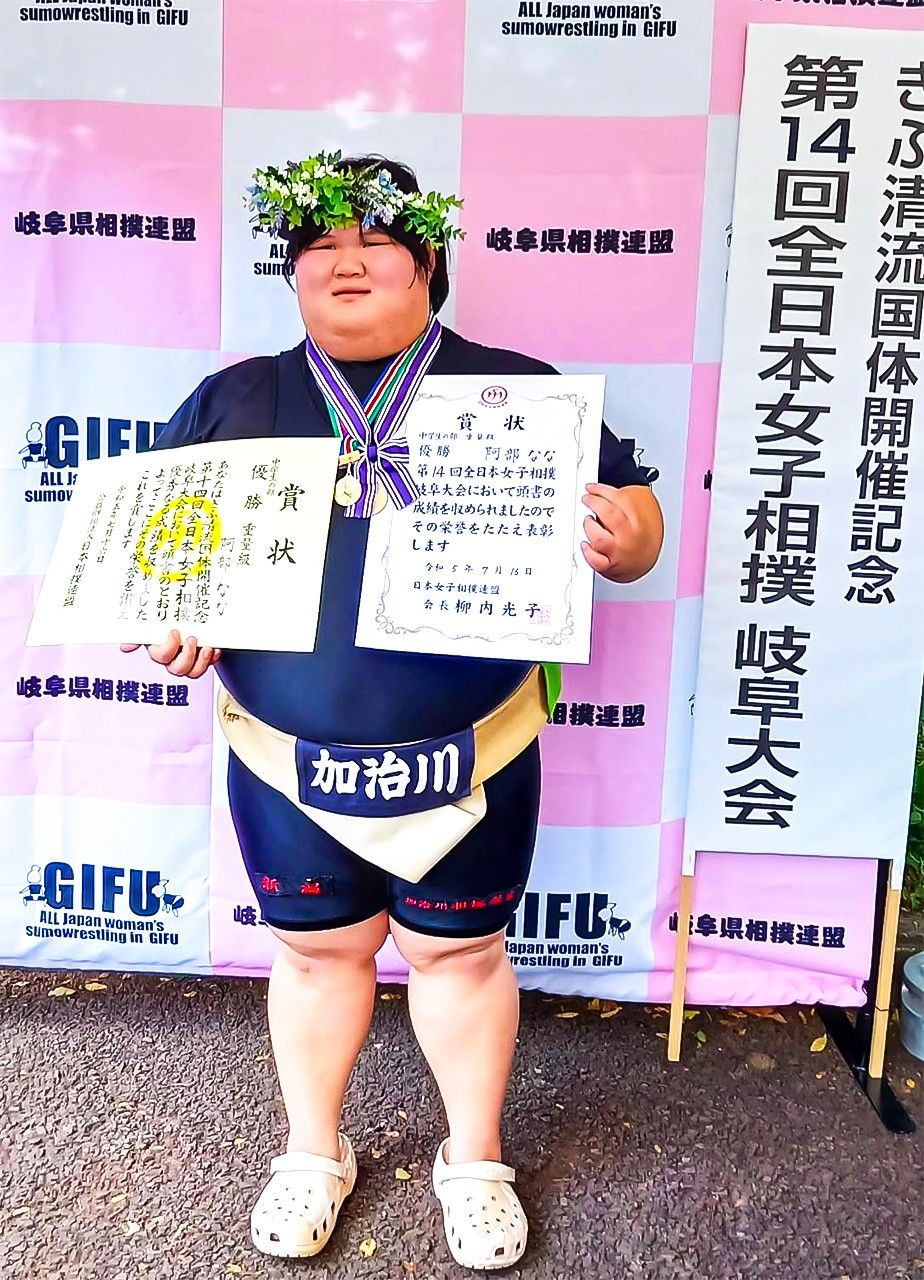
Abe celebrating her victory in the Junior High Division Heavyweight Class at the July 16, 2023, All Japan Women’s Sumō Gifu Tournament. She claimed the title using her signature move of driving her opponent out of the ring by force, or oshidashi. (Courtesy Abe Nana)
“My sister is shy and always hiding in my shadow. But when she steps into the ring, she turns into a superhero,” says Nana’s sister Sakura, who is two years older.
When the two were still in elementary school, Sakura decided to try the Wanpaku Sumō Tournament, a national children’s sumō event organized by the Nihon Sumō Kyōkai and the Junior Chamber International Tokyo, and Nana tagged along. That was the Abe sisters’ first experience with sumō. Sakura lost in the semifinals, but Nana took to the sport like an old pro and was crowned the champion.
“I won my first tournament in the fourth grade and have been dreaming of being a world champ ever since. I want to make my oshidashi even stronger,” says the teen prodigy.
Insisting that interviews make her terribly nervous, her voice is so quiet it is hard to believe this is the same girl who thunders in the ring. However, when I ask what weak points she is looking to cover, she answers confidently: “I don’t have any!”
Abe’s goal is to earn a living off sumō alone. But for now, there is no way for a woman to do that. Sakura, who has been serving as her sister’s second so far, says, “It’s messed up that a girl who has been working so hard has to feel so much stress because of her gender.” Her voice is full of passion.
“It’s cool to see girls slamming into one another with full force, not worrying about what people think. Everyone is serious. Everyone’s giving it their all, just like in professional-level ōzumō. If everyone could see how great it is, I think it would get tons of fans the same way. And then, Nana would be able to live her dream.”
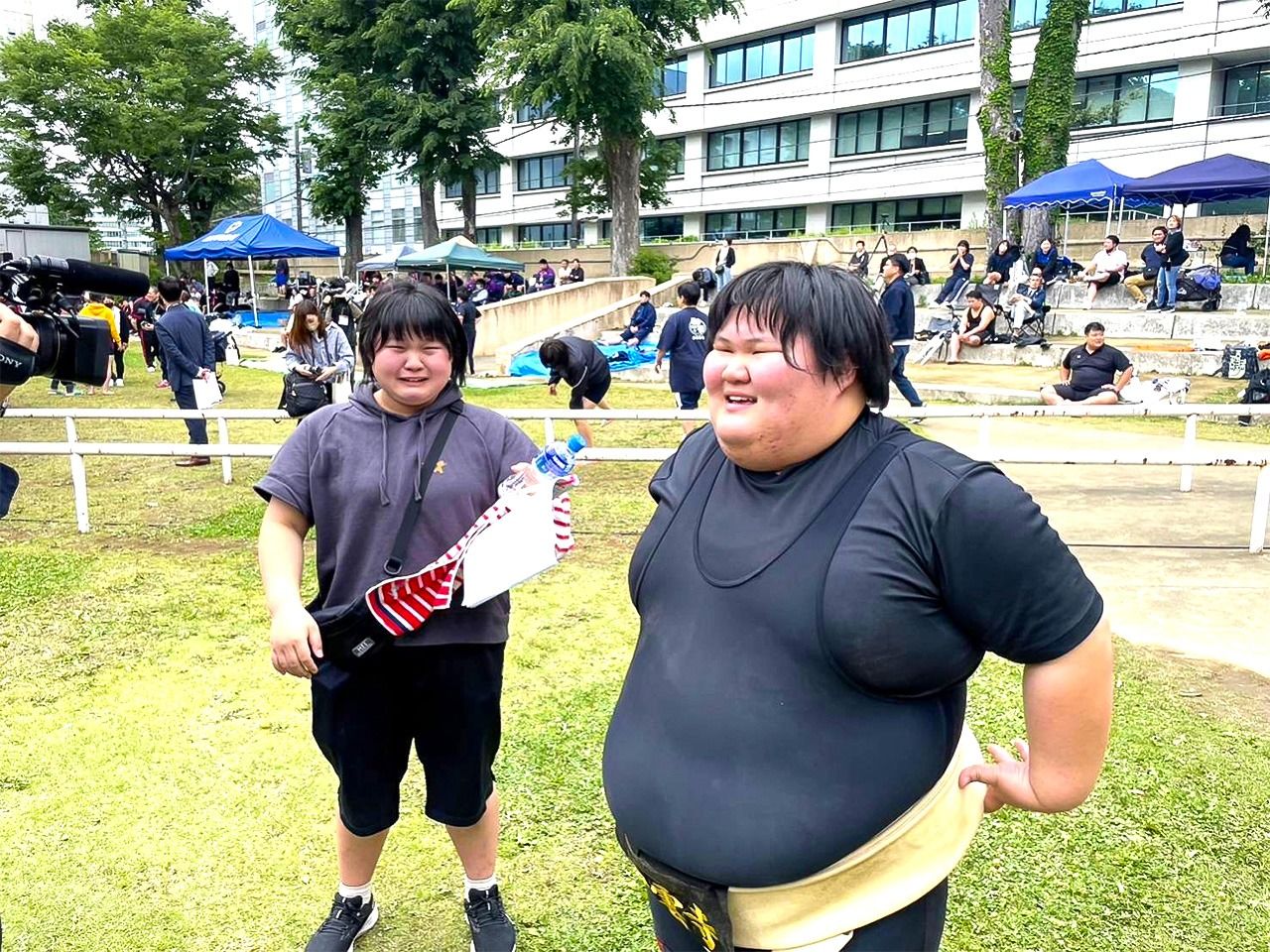
Abe Nana won handily at the All Japan Sumō Individual Weight Class Tournament held May 14, 2023—which is often the first step toward professional sumō. Sakura (left) had tears in her eyes at her sister’s opening to the world championship. (Courtesy Abe Nana)
Hisano Airi Takes On the Unclassified Division
The Unchallenged. That is what they call 24-year-old Hisano Airi. Abe Nana was quick to offer up her name when asked who she looks up to, saying, “She’s so strong, and so kind.”
At the New Year’s Women’s Sumō Japan Championship, she was the first ever national champion after winning the final round, which saw all the division winners face off. She is overwhelmingly strong, but she got a late start in the game, only starting in university.
“I originally started out doing karate, but when I was in sixth grade, I entered the Wanpaku Sumō Tournament and took second place. As soon as I got into junior high, an older student started pushing me to join the jūdō club, saying they were impressed by my sumō matches.”
She kept at jūdō through junior high and high school, but says, “People bullied me. So, I dropped out of the club and high school both.” She moved to another school and tried jūdō again but could not forget the painful memories. She was recommended sumō as a change of pace.
“The bouts are over in two or three seconds, so it’s faster and more thrilling than jūdō. It’s also interesting in how clear it is. If you hit the dirt or leave the ring, you lose.”
Nihon University spotted her talent at her first tournament, and she was on her way to women’s sumō in earnest. On top of the core strengths she built in karate and the power honed in jūdō, her natural sense is outstanding.
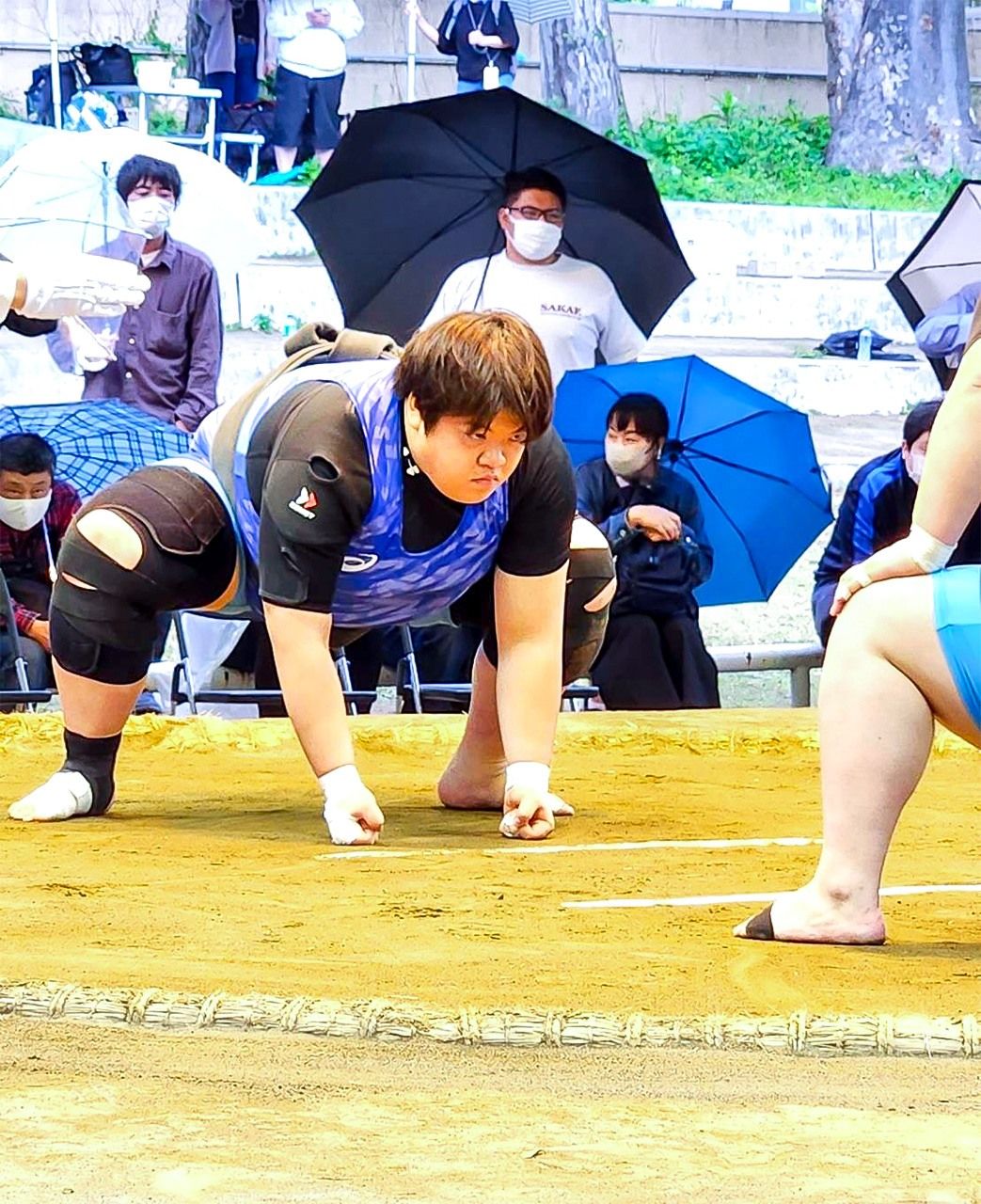
“I’m still new to sumō, so there’s still a lot of room to improve my skills. I want to learn by facing experienced wrestlers,” says Hisano, showing off her ambitions. (Courtesy Hisano Airi)
Hisano has won four national tournaments, and everyone around her calls her the “absolute ruler.” But if she does lose, it would be that much more of an ordeal—and the thought of that used to cause her body, which should move on its own accord, to freeze up. It stood in the way of wrestling the way she wanted.
Still struggling with that conflict, she joined the World Games last year. In her first match, she faced off against a powerful opponent considered to be in the running for the championship. In the instant they clashed, she recalls, she felt an all-new excitement in the sport. Not only was the opposing rikishi strong, but it was clear she truly enjoyed sumō.
“I felt thrilled by the thought of fighting against the world’s best and forgot about the pressure of being the champion.” This new inspiration fueled her on, and she placed third in the heavyweight class.
“When you’re working to be stronger, it doesn’t matter if you’re a man or woman. Like Raoh from Fist of the North Star, when I’m in the ring I want to be strong, and kind, and cool.”
Currently, she is working as a security guard while she continues training. Her days are hard, but she is unwavering in her desire to be the best.
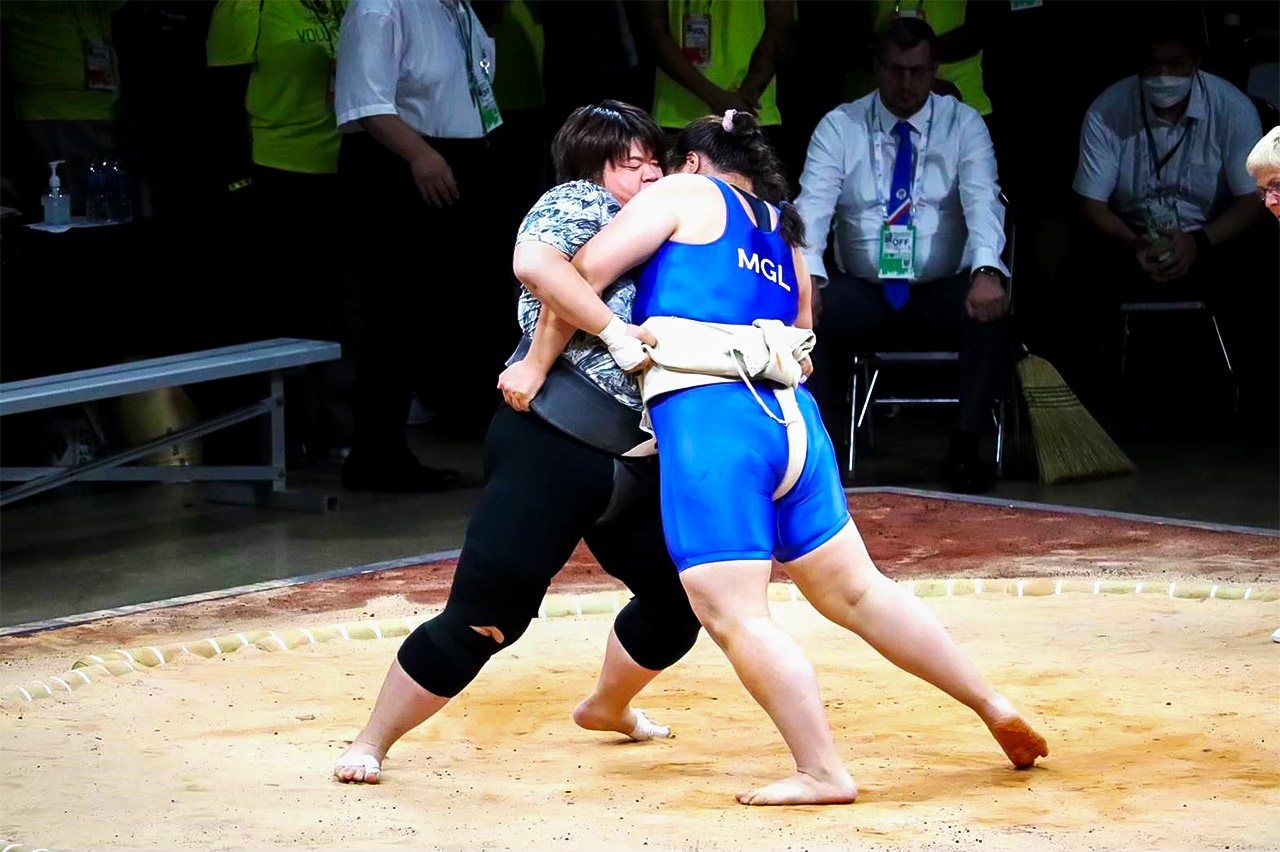
Hisano facing the Mongolian representative at the World Games 2022 in Birmingham, Alabama. Hisano is now working to build muscle mass to better face larger competitors from overseas. (Courtesy Hisano Airi)
Winning in Her Own Way
I think Hasegawa Rio’s orange-dyed hair suits her. When I tell her so, she says, “That makes me happy! I’m focusing on the national team qualifiers, so I wanted to brighten things up for a fresh start.” Hasegawa, now a sophomore at Keiō University, is the first woman member in the 103-year history of the school’s sumō club.
“People tell me wrestlers have to have black hair, but just like pro table tennis players can braid their hair and still play at the high level, I want to have both style and strength, too.”
As if giving proof to her words, she won the national team qualifying round. She has been called a prodigy since childhood and won a national championship against adult wrestlers while still in junior high. She has been national champ in university, as well, and in 2022 won the Japan Women’s Sumō Federation MVP award and the Japan Sumō Federation’s Outstanding Individual award. She cannot be stopped.
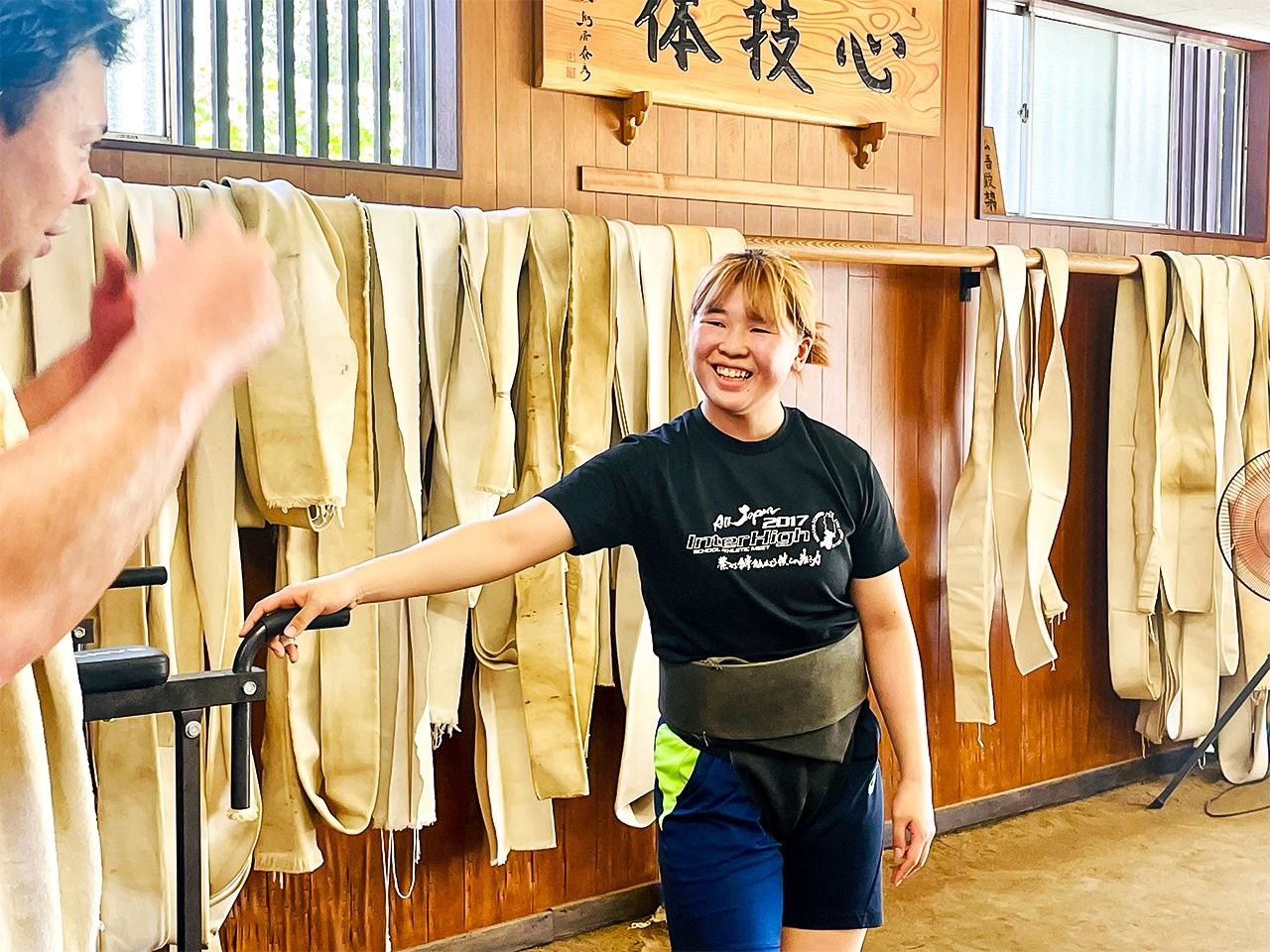
Hasegawa at the Keiō University Tsunamachi Gym. She practices four days a week with the team where her brother was once captain. Here, she enjoys a chat with the coach and teammates. (© Hanioka Yuri)
“Up to junior high I wrestled because adults wanted me to. I didn’t have any hobbies or play any games. I trained hard every day. But I thought my father would be angry if I quit.”
Soon after she moved on to high school, though, her father suddenly died. When she was faced with the choice between continuing sumō or taking another path, she recalled her experience at the World Junior Women’s Sumō Tournament earlier that year.
“We won the team tournament but, in the individuals, I took third in the middle-weight class. It was so disappointing. It took me time, but I realized that the next time I wanted to take first,” she says, and so chose on her own to go to a high school with a sumō team.
Hasegawa was the only female member. She could not practice with others during the pandemic, but threw herself into training anyway. “Working twice as hard will finally let me get results to be proud of,” she says.
“I won the world junior individual championship in tenth grade because I could wrestle free from anyone else’s rules. I want women’s sumō to be a sport where I can be myself. I don’t want to give up on studies or wearing makeup, and I want to follow my favorite pop idols. I want to give my all to everything.”
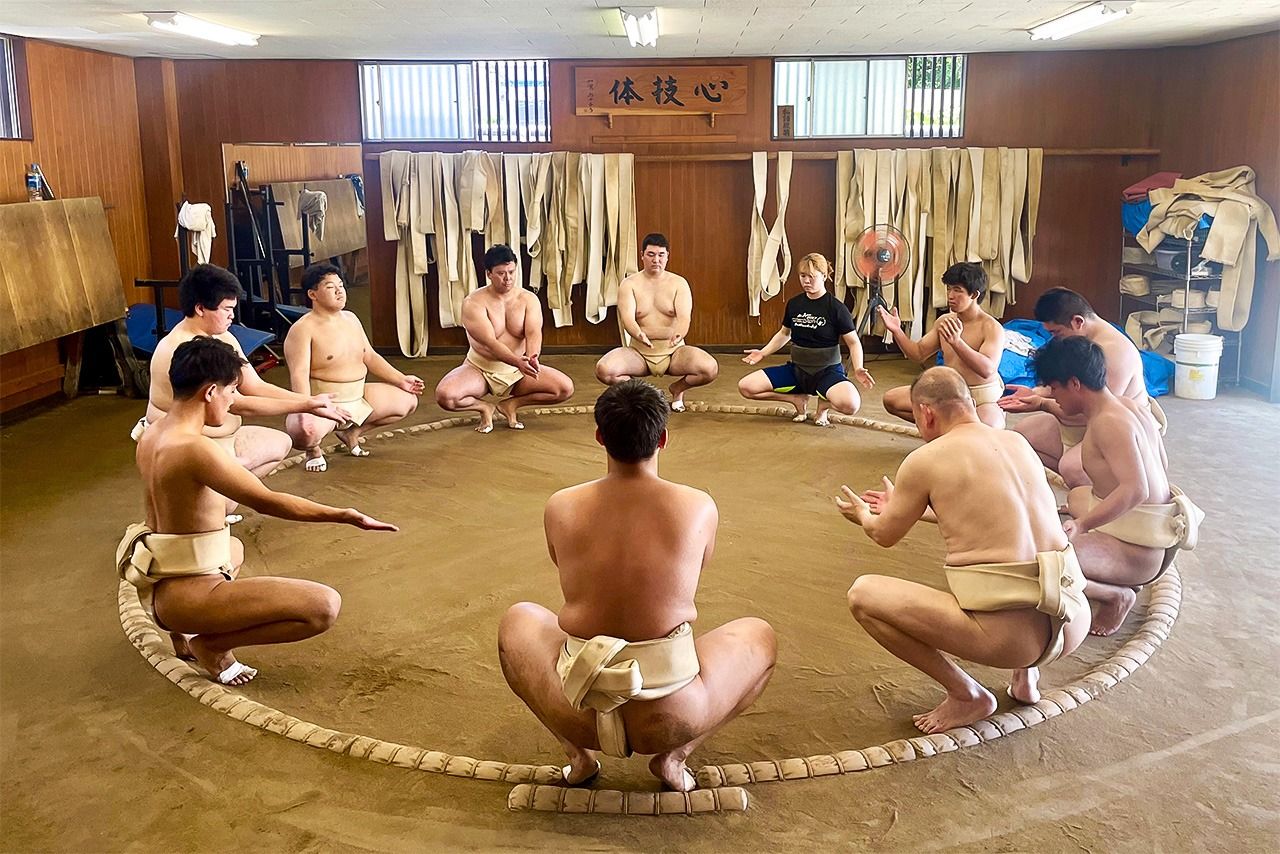
Boys used to tease her when she was small, but now, “Not at all. There are men on the team who say I’m the coolest. That makes me happy. The really strong people don’t worry about gender.” (© Hanioka Yuri)
Hasegawa says, “I want to develop amateur sumō as a pure sport while respecting the tradition of sumō as a martial art. People love sumō overseas because it’s seen as a sport like baseball and soccer. Japan can’t get let its guard down just because sumō is our national sport.”
And she also says that the “gap” is the real fun of women’s sumō.
“There are lots of thin wrestlers, and so you have these totally ordinary girls rushing together, their hair flying, and getting thrown around. It might be painful to watch, but it really moves me. Our spirit is the equal of any guy’s. I think the audience definitely senses that.”
Heavyweight Kon Hiyori Takes the Sport Global
“Rio’s such a cutie. And she’s such a solid wrestler, it’s hard to tell whether she’s the veteran or I am, at this point.”
25-year-old Kon Hiyori speaks with a thick Tsugaru accent from her native Aomori Prefecture. She has trained with Hasegawa, and they are good friends.
Kon is a pioneer in women’s sumō. She has taken second place at the World Women’s Sumō Championships twice and was featured in the documentary Little Miss Sumō. The film, which demonstrates her efforts while also examining the issues of gender in sumō, was directed by British filmmaker Michael Kay and has screened at film festivals worldwide. Kon was also selected for the BBC’s 100 Women 2019 series. She now continues sumō as a member of a company team.
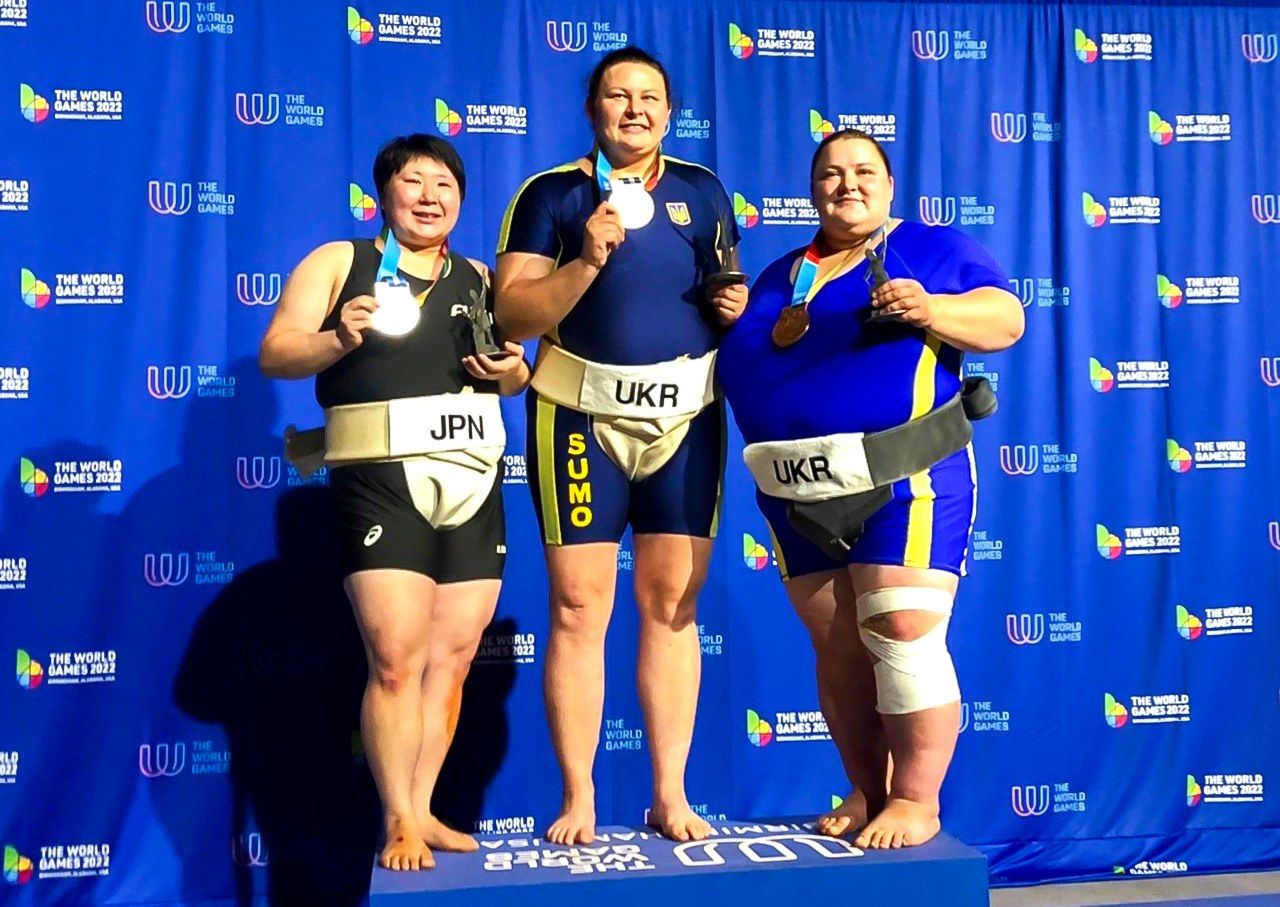
Kon (left) took silver at the World Games 2022 in the women’s openweight division. She shared the podium with wrestlers from powerhouse Ukraine, the gold medalist Ivanna Berezovska (center) and bronze medalist Svitlana Iaromka. (Courtesy Kon Hiyori)
“The gym in Aomori was pretty harsh, like, ‘Don’t you go crying. You’ll practice until you get frostbite.’ It was really hard. But I kept at it because there are countries I could never have visited, and people I never would have met, without sumō. Even this October I’m flying to Saudi Arabia for the World Combat Games.”
Her dream is to spread sumō around the world. From April of next year, she will start teaching sumō in Argentina as an overseas volunteer with the Japan International Cooperation Agency.
“Sumō’s good point is that anyone can do it; all you need is your body. I think even a housewife who only wrestles once a week can call herself a sumō wrestler. I want to show people how wrestling and loving sumō can be freer.”
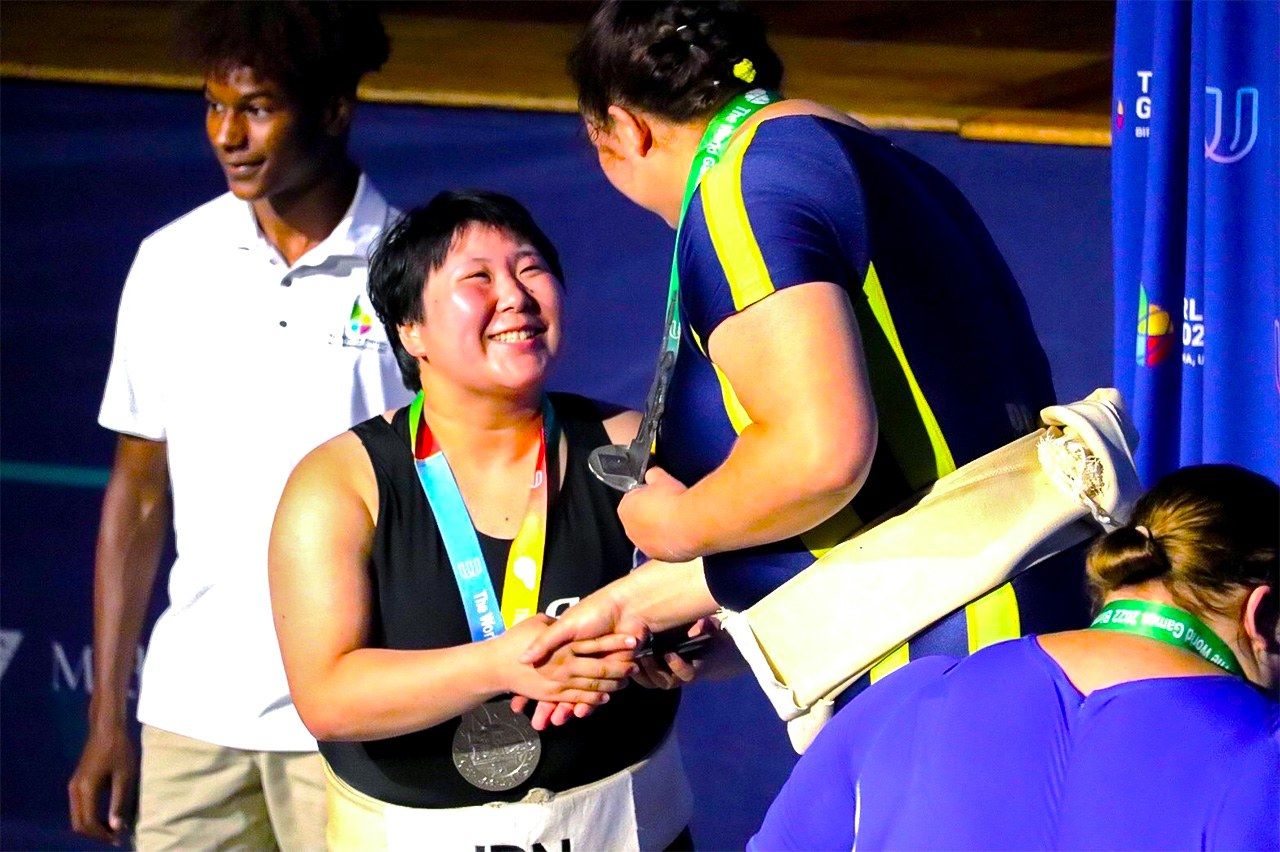
At the World Games 2022. Kon says that meeting with overseas wrestlers has been important in her efforts to popularize sumō. (Courtesy Kon Hiyori)
(Originally published in Japanese. Banner photo: Hasegawa Rio training at the Keiō University sumō stable. © Hanioka Yuri.)